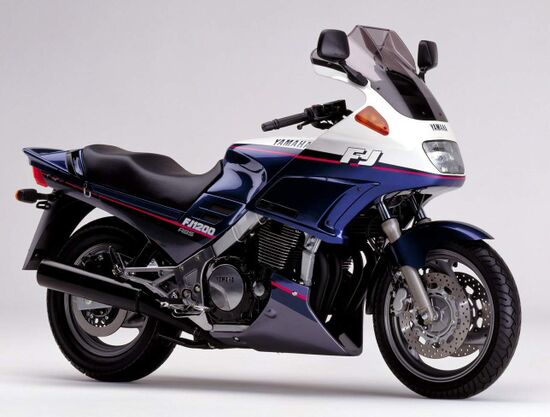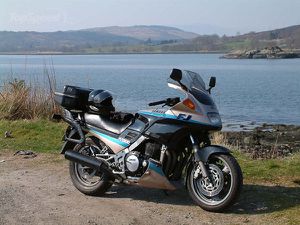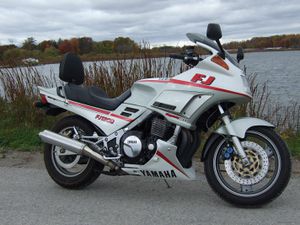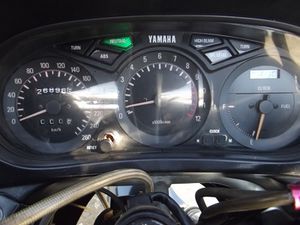Difference between revisions of "Yamaha FJ1200"
(→Технические характеристики) |
m |
||
| (10 intermediate revisions by 2 users not shown) | |||
| Line 1: | Line 1: | ||
| − | {{DISPLAYTITLE: | + | {{DISPLAYTITLE: Yamaha FJ 1200}} |
| − | + | __notoc__ | |
| − | + | [[file: Yamaha FJ1200 94.jpg | 550px | center | Yamaha FJ 1200 1993 onwards]] | |
| − | + | The Yamaha FJ 1200 appeared in 1986 as a successor to the Yamaha FJ1100. | |
| − | + | {{Ads_top}} | |
| − | + | The motorcycle was focused mainly on foreign markets (Europe and the USA), but in 1991 it was officially sold in Japan as well. Also noteworthy was the fact that the Yamaha FJ1200 model produced at that time a record power of 130 hp. (among Japanese air-cooled engines) and became the first Japanese motorcycle with ABS as an option. | |
| − | [[ | + | The model was based on an in-line 4-cylinder air-cooled engine taken from the FJ1100 and increased its volume to 1188 cc. cm. As a result, the maximum power rose to 130 hp, and the torque - up to 108 Nm. The Japanese versions were throttled to 97 hp. European versions produced from 96 to 130 hp. |
| − | |||
| − | |||
| − | + | Among the features of the Yamaha FJ1200, a steel frame, adjustable suspensions, a hydraulic clutch, a 5-speed gearbox, versions with ABS (since 1990 - FJ1200A), a 22-liter fuel tank and 258 kg of curb weight should be distinguished. | |
| − | + | `` Major generations of Yamaha FJ 1200 '': | |
| + | * 1986-1987 - '''first generation'''. The data models of the years strongly resemble the FJ1100. The motorcycle does not have a fuel pump, is equipped with an anti-dive system, has a 16 'front wheel, 2-piston front calipers, 1-piston rear caliper, non-ventilated brake discs, analog TCI ignition and aluminum rear suspension. | ||
| + | * 1988-1989 - '''second generation'''. Motorcycles of these years do not have an anti-bite system, they are equipped with a 17 'front wheel, 4-piston front calipers and ventilated discs of 298 mm, a 2-piston rear brake, a fuel pump and TCI digital ignition. | ||
| + | * 1990-1996 - '''third generation'''. In addition to the basic version, there are also versions with ABS (FJ1200A). Instead of an aluminum rear suspension, the model gets a steel one. | ||
| − | + | The model was produced until 1993, after which it was discontinued. Sales of new motorcycles were carried out until 1996 (UK). In 2001, a new model was introduced as the successor to the Yamaha FJ 1200 - [[Yamaha_FJR1300 | Yamaha FJR 1300]]. | |
| − | |||
| − | |||
| − | |||
| − | + | '' The main competitors of the Yamaha FJ 1200 in the class: '' | |
| − | + | * [[Honda_CBR1000F | Honda CBR 1000 F]] | |
| − | '' | + | * [[Kawasaki_GPZ1100 | Kawasaki GPZ 1100]] |
| − | * [[Honda_CBR1000F|Honda CBR 1000 F]] | ||
| − | * [[Kawasaki_GPZ1100|Kawasaki GPZ 1100]] | ||
* Suzuki GSX 1100 F Katana | * Suzuki GSX 1100 F Katana | ||
| + | == Photos == | ||
| + | {| border = "0" | ||
| + | | [[Image: 1986-yamaha-fj1100-and-ya-5 600x0w.jpg | 300px | thumb | right | Yamaha FJ 1200]] | ||
| + | | [[Image: 2008-10-25-bikepics-1461462-full.jpg | 300px | thumb | right | Yamaha FJ 1200]] | ||
| + | | [[Image: Eee39047f553783b9aca0de72b7c69c2.jpg | 300px | thumb | right | Yamaha FJ 1200]] | ||
| + | |- | ||
| + | |} | ||
| − | + | {{Ads_feed}} | |
| − | + | {{Ads_post}} | |
| − | |||
| − | |||
| − | |||
| − | |||
| − | |||
| − | |||
| − | |||
| − | |||
| − | |||
| − | |||
| − | |||
| − | |||
| − | |||
| − | |||
| − | |||
| − | |||
| − | |||
| − | |||
| − | |||
| − | |||
| − | |||
| − | |||
| − | |||
| − | |||
| − | |||
| − | |||
| − | |||
| − | |||
| − | |||
| − | |||
| − | |||
| − | |||
| − | |||
| − | |||
| − | |||
| − | |||
| − | |||
| − | |||
| − | |||
| − | |||
| − | |||
| − | |||
| − | |||
| − | |||
| − | |||
| − | |||
| − | |||
| − | |||
| − | |||
| − | |||
| − | |||
| − | |||
| − | |||
| − | |||
| − | == | + | == Specifications == |
| − | + | Specifications Yamaha FJ 1200: | |
| − | + | {| class = "wikitable" | |
| − | + | ! scope = "row" | Model | |
| − | + | | Yamaha FJ 1200 | |
| − | |||
| − | |||
| − | {| class="wikitable" | ||
| − | ! scope="row"| | ||
| − | |Yamaha FJ 1200 | ||
|- | |- | ||
| − | ! scope="row"| | + | ! scope = "row" | Motorcycle type |
| − | | | + | | sports tourist |
|- | |- | ||
| − | ! scope="row"| | + | ! scope = "row" | Release year |
| − | |1986-1993 (1996) | + | | 1986-1993 (1996) |
|- | |- | ||
| − | ! scope="row"| | + | ! scope = "row" | Frame |
| − | | | + | | steel tubular |
|- | |- | ||
| − | ! scope="row"| | + | ! scope = "row" | Engine type |
| − | |4- | + | | 4-cylinder, 4-stroke, in-line |
|- | |- | ||
| − | ! scope="row"| | + | ! scope = "row" | Working volume |
| − | |1188 | + | | 1188 cc cm. |
|- | |- | ||
| − | ! scope="row"| | + | ! scope = "row" | Bore / stroke |
| − | | | + | | 77mm x 63.8mm |
|- | |- | ||
| − | ! scope="row"| | + | ! scope = "row" | Compression ratio |
| − | |9 | + | | 9.7: 1 |
|- | |- | ||
| − | ! scope="row"| | + | ! scope = "row" | Cooling |
| − | | | + | | air |
|- | |- | ||
| − | ! scope="row"| | + | ! scope = "row" | Number of valves per cylinder |
| − | |DOHC, 4 | + | | DOHC, 4 valves per cylinder |
|- | |- | ||
| − | ! scope="row"| | + | ! scope = "row" | Fuel supply system |
| − | | | + | | carburetor, 4x Mikuni BS36 |
|- | |- | ||
| − | ! scope="row"| | + | ! scope = "row" | Ignition type |
| − | |TCI ( | + | | TCI (analog) - 1986-1987 |
| − | TCI ( | + | TCI (digital) - 1988-1993 (1996) |
|- | |- | ||
| − | ! scope="row"| | + | ! scope = "row" | Maximum power |
| − | |130 | + | | 130 hp at 9000 rpm (112.5 HP at 8600 rpm - on the wheel) |
| − | 97 | + | 97 h.p. - Japanese versions |
| − | 96-130 | + | 96-130 h.p. - European versions |
|- | |- | ||
| − | ! scope="row"| | + | ! scope = "row" | Maximum torque |
| − | |108 | + | | 108 Nm at 7500 rpm |
|- | |- | ||
| − | ! scope="row"| | + | ! scope = "row" | Gearbox |
| − | |5- | + | | 5-speed |
|- | |- | ||
| − | ! scope="row"| | + | ! scope = "row" | Drive type |
| − | | | + | | chain |
|- | |- | ||
| − | ! scope="row"| | + | ! scope = "row" | Front tire size |
| − | |120/80-VR16 - 1986-1987 | + | | 120/80-VR16 - 1986-1987 |
120/70-VR17 | 120/70-VR17 | ||
|- | |- | ||
| − | ! scope="row"| | + | ! scope = "row" | Rear tire size |
| − | |150/80 V16 | + | | 150/80 V16 |
|- | |- | ||
| − | ! scope="row"| | + | ! scope = "row" | Front brakes |
| − | |2 | + | | 2 discs, 282mm, 2-piston calipers - 1986-1987 |
| − | 2 | + | 2 discs (vented), 298mm, 4-piston calipers - 1988-1993 (1996) |
|- | |- | ||
| − | ! scope="row"| | + | ! scope = "row" | Rear brakes |
| − | |1 | + | | 1 disc, 282 mm, 1-piston caliper - 1986-1987 |
| − | + | Single disc, 282 mm, 2-piston caliper - 1988-1993 (1996) | |
|- | |- | ||
| − | ! scope="row"| | + | ! scope = "row" | Front suspension |
| − | | | + | | 41mm telescopic fork (adjustable preload and rebound damping). stroke - 150 mm |
|- | |- | ||
| − | ! scope="row"| | + | ! scope = "row" | Rear suspension |
| − | | | + | | swingarm with monoshock Sachs (adjustable preload and rebound damping), stroke - 120 mm |
|- | |- | ||
| − | ! scope="row"| | + | ! scope = "row" | Dimensions (LxWxH) |
| − | |2230х775х1200 | + | | 2230х775х1200 mm |
|- | |- | ||
| − | ! scope="row"| | + | ! scope = "row" | Saddle height |
| − | |780 | + | | 780 mm |
|- | |- | ||
| − | ! scope="row"| | + | ! scope = "row" | Wheelbase |
| − | |1490 | + | | 1490 mm |
|- | |- | ||
| − | ! scope="row"| | + | ! scope = "row" | Fuel tank capacity |
| − | |22 | + | | 22 l (including reserve 5 l) |
|- | |- | ||
| − | ! scope="row"| | + | ! scope = "row" | Maximum speed |
| − | |244 | + | | 244.3 km / h |
|- | |- | ||
| − | ! scope="row"| | + | ! scope = "row" | Acceleration to 100 km / h |
| − | |3 | + | | 3.4 sec |
|- | |- | ||
| − | ! scope="row"| | + | ! scope = "row" | Motorcycle weight (curb) |
| − | |258 | + | | 258 kg - FJ1200 (1986-1987) |
| − | 266 | + | 266 kg - FJ1200 (1988-1996) |
| − | 274 | + | 274 kg - FJ1200A (with ABS) |
|} | |} | ||
| − | == | + | == Documentation == |
| − | + | [[Category:Motorcycles]] | |
| − | + | * [[Yamaha_FJ1200:_manuals|Yamaha FJ1200]] | |
| − | |||
| − | |||
| − | |||
| − | |||
| − | * | ||
| − | |||
| − | |||
| − | |||
| − | |||
| − | |||
| − | |||
| − | |||
| − | |||
| − | |||
| − | |||
| − | |||
| − | |||
| − | |||
| − | |||
| − | |||
| − | + | == == | |
| − | + | {{Ads_recomended}} | |
| − | |||
| − | == | ||
| − | |||
Latest revision as of 19:17, 15 August 2021
The Yamaha FJ 1200 appeared in 1986 as a successor to the Yamaha FJ1100.
The motorcycle was focused mainly on foreign markets (Europe and the USA), but in 1991 it was officially sold in Japan as well. Also noteworthy was the fact that the Yamaha FJ1200 model produced at that time a record power of 130 hp. (among Japanese air-cooled engines) and became the first Japanese motorcycle with ABS as an option. The model was based on an in-line 4-cylinder air-cooled engine taken from the FJ1100 and increased its volume to 1188 cc. cm. As a result, the maximum power rose to 130 hp, and the torque - up to 108 Nm. The Japanese versions were throttled to 97 hp. European versions produced from 96 to 130 hp.
Among the features of the Yamaha FJ1200, a steel frame, adjustable suspensions, a hydraulic clutch, a 5-speed gearbox, versions with ABS (since 1990 - FJ1200A), a 22-liter fuel tank and 258 kg of curb weight should be distinguished.
`` Major generations of Yamaha FJ 1200 :
- 1986-1987 - first generation. The data models of the years strongly resemble the FJ1100. The motorcycle does not have a fuel pump, is equipped with an anti-dive system, has a 16 'front wheel, 2-piston front calipers, 1-piston rear caliper, non-ventilated brake discs, analog TCI ignition and aluminum rear suspension.
- 1988-1989 - second generation. Motorcycles of these years do not have an anti-bite system, they are equipped with a 17 'front wheel, 4-piston front calipers and ventilated discs of 298 mm, a 2-piston rear brake, a fuel pump and TCI digital ignition.
- 1990-1996 - third generation. In addition to the basic version, there are also versions with ABS (FJ1200A). Instead of an aluminum rear suspension, the model gets a steel one.
The model was produced until 1993, after which it was discontinued. Sales of new motorcycles were carried out until 1996 (UK). In 2001, a new model was introduced as the successor to the Yamaha FJ 1200 - Yamaha FJR 1300.
The main competitors of the Yamaha FJ 1200 in the class:
- Honda CBR 1000 F
- Kawasaki GPZ 1100
- Suzuki GSX 1100 F Katana
Photos
Specifications
Specifications Yamaha FJ 1200:
| Model | Yamaha FJ 1200 |
|---|---|
| Motorcycle type | sports tourist |
| Release year | 1986-1993 (1996) |
| Frame | steel tubular |
| Engine type | 4-cylinder, 4-stroke, in-line |
| Working volume | 1188 cc cm. |
| Bore / stroke | 77mm x 63.8mm |
| Compression ratio | 9.7: 1 |
| Cooling | air |
| Number of valves per cylinder | DOHC, 4 valves per cylinder |
| Fuel supply system | carburetor, 4x Mikuni BS36 |
| Ignition type | TCI (analog) - 1986-1987
TCI (digital) - 1988-1993 (1996) |
| Maximum power | 130 hp at 9000 rpm (112.5 HP at 8600 rpm - on the wheel)
97 h.p. - Japanese versions 96-130 h.p. - European versions |
| Maximum torque | 108 Nm at 7500 rpm |
| Gearbox | 5-speed |
| Drive type | chain |
| Front tire size | 120/80-VR16 - 1986-1987
120/70-VR17 |
| Rear tire size | 150/80 V16 |
| Front brakes | 2 discs, 282mm, 2-piston calipers - 1986-1987
2 discs (vented), 298mm, 4-piston calipers - 1988-1993 (1996) |
| Rear brakes | 1 disc, 282 mm, 1-piston caliper - 1986-1987
Single disc, 282 mm, 2-piston caliper - 1988-1993 (1996) |
| Front suspension | 41mm telescopic fork (adjustable preload and rebound damping). stroke - 150 mm |
| Rear suspension | swingarm with monoshock Sachs (adjustable preload and rebound damping), stroke - 120 mm |
| Dimensions (LxWxH) | 2230х775х1200 mm |
| Saddle height | 780 mm |
| Wheelbase | 1490 mm |
| Fuel tank capacity | 22 l (including reserve 5 l) |
| Maximum speed | 244.3 km / h |
| Acceleration to 100 km / h | 3.4 sec |
| Motorcycle weight (curb) | 258 kg - FJ1200 (1986-1987)
266 kg - FJ1200 (1988-1996) 274 kg - FJ1200A (with ABS) |
Documentation



